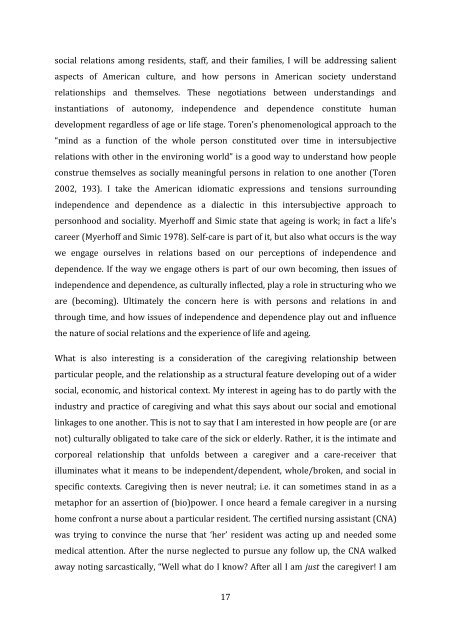Philip Y. Kao PhD thesis - Research@StAndrews:FullText
Philip Y. Kao PhD thesis - Research@StAndrews:FullText
Philip Y. Kao PhD thesis - Research@StAndrews:FullText
Create successful ePaper yourself
Turn your PDF publications into a flip-book with our unique Google optimized e-Paper software.
social relations among residents, staff, and their families, I will be addressing salient<br />
aspects of American culture, and how persons in American society understand<br />
relationships and themselves. These negotiations between understandings and<br />
instantiations of autonomy, independence and dependence constitute human<br />
development regardless of age or life stage. Toren's phenomenological approach to the<br />
“mind as a function of the whole person constituted over time in intersubjective<br />
relations with other in the environing world” is a good way to understand how people<br />
construe themselves as socially meaningful persons in relation to one another (Toren<br />
2002, 193). I take the American idiomatic expressions and tensions surrounding<br />
independence and dependence as a dialectic in this intersubjective approach to<br />
personhood and sociality. Myerhoff and Simic state that ageing is work; in fact a life's<br />
career (Myerhoff and Simic 1978). Self-care is part of it, but also what occurs is the way<br />
we engage ourselves in relations based on our perceptions of independence and<br />
dependence. If the way we engage others is part of our own becoming, then issues of<br />
independence and dependence, as culturally inflected, play a role in structuring who we<br />
are (becoming). Ultimately the concern here is with persons and relations in and<br />
through time, and how issues of independence and dependence play out and influence<br />
the nature of social relations and the experience of life and ageing.<br />
What is also interesting is a consideration of the caregiving relationship between<br />
particular people, and the relationship as a structural feature developing out of a wider<br />
social, economic, and historical context. My interest in ageing has to do partly with the<br />
industry and practice of caregiving and what this says about our social and emotional<br />
linkages to one another. This is not to say that I am interested in how people are (or are<br />
not) culturally obligated to take care of the sick or elderly. Rather, it is the intimate and<br />
corporeal relationship that unfolds between a caregiver and a care-receiver that<br />
illuminates what it means to be independent/dependent, whole/broken, and social in<br />
specific contexts. Caregiving then is never neutral; i.e. it can sometimes stand in as a<br />
metaphor for an assertion of (bio)power. I once heard a female caregiver in a nursing<br />
home confront a nurse about a particular resident. The certified nursing assistant (CNA)<br />
was trying to convince the nurse that ‘her’ resident was acting up and needed some<br />
medical attention. After the nurse neglected to pursue any follow up, the CNA walked<br />
away noting sarcastically, “Well what do I know? After all I am just the caregiver! I am<br />
17
















